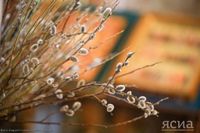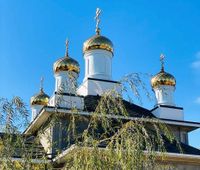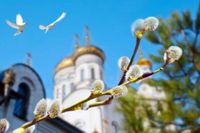On April 13, 2025, Orthodox Christians around the world will observe Palm Sunday, also known as the Entry of the Lord into Jerusalem. This significant holiday marks the beginning of Holy Week and is celebrated one week before Easter, which falls on April 20 this year. The day is rich in spiritual meaning and tradition, commemorating the moment when Jesus Christ triumphantly entered Jerusalem, greeted by a joyful crowd.
The event is rooted in the Gospel account, which describes how Jesus rode into the city on a donkey, symbolizing peace. The people spread palm branches and their garments along the road, shouting, "Hosanna to the Son of David! Blessed is He who comes in the name of the Lord!" This moment not only signifies the recognition of Jesus as the Messiah but also foreshadows His impending suffering and crucifixion.
Traditionally, in regions where palm trees are scarce, such as Russia, willow branches are used instead. This adaptation highlights the cultural significance of the holiday, as willow is one of the first plants to bloom in spring, symbolizing renewal and resurrection. The practice of blessing willow branches during church services dates back to the 4th century, and these branches are cherished by believers throughout the year.
On the eve of Palm Sunday, known as Lazarus Saturday, the resurrection of Lazarus is commemorated, reinforcing the themes of life and rebirth that permeate the holiday. The sacred willow branches are typically brought to church for blessing during the All-Night Vigil, after which they are taken home and placed near icons as a protective talisman against illness and misfortune.
Church services on Palm Sunday are marked by solemnity and reverence. Worshippers hold willow branches, flowers, and lit candles, participating in prayers that invoke blessings. The branches are not discarded; instead, they are kept in homes until the next year, symbolizing God's continued protection and favor.
In addition to the religious observances, Palm Sunday is steeped in various customs and folk beliefs. It is common for families to lightly whip each other with willow branches, accompanied by the phrase, "So that you do not get sick!" This playful tradition is believed to impart health and well-being. Furthermore, the day is often marked by a special meal, where fish and a small amount of red wine are permitted, while meat, eggs, and dairy products remain off-limits due to the ongoing Lenten fast.
However, Palm Sunday is not just about food and festivities; it is a day for spiritual reflection. Believers are encouraged to avoid worldly distractions, refrain from physical labor, and focus on prayer and family. This period of contemplation is essential as it leads into Holy Week, the most solemn time in the Christian calendar.
Weather-related omens also play a role in the observance of Palm Sunday. For instance, clear skies on this day are thought to predict a bountiful harvest, while frost may indicate a fruitful yield of spring crops. It is believed that if willow buds bloom before the holiday, the year ahead will be prosperous.
In some regions, ancient traditions have survived, including the hosting of willow fairs, where artisans sell handcrafted items and decorative willow branches. These fairs serve as a communal celebration of the holiday, blending religious observance with cultural festivities.
As Palm Sunday approaches, many Orthodox Christians reflect on its deeper significance. It serves as a reminder of the choices individuals face in their spiritual journeys: to welcome Christ with open hearts or to turn away from His teachings. The holiday encapsulates the duality of joy and sorrow, as the same crowd that celebrated Jesus' entry into Jerusalem would later demand His crucifixion.
In conclusion, Palm Sunday is not merely a festive occasion; it is a profound spiritual event that invites believers to engage in reflection, community, and worship. As Orthodox Christians prepare to celebrate this important day, they embrace the traditions that connect them to their faith and to one another, reinforcing the bonds of family and community.








